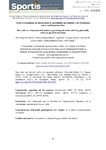Cómo se comunican las tareas importa: necesidades psicológicas y ser físicamente activo en Educación Física

Use este enlace para citar
http://hdl.handle.net/2183/36486
A non ser que se indique outra cousa, a licenza do ítem descríbese como Atribución-NoComercial-CompartirIgual 3.0 España
Coleccións
Metadatos
Mostrar o rexistro completo do ítemTítulo
Cómo se comunican las tareas importa: necesidades psicológicas y ser físicamente activo en Educación FísicaTítulo(s) alternativo(s)
How Task Are Communicated Matters: Psychological Needs and Being Physically Active in Physical EducationAutor(es)
Data
2024-01-01Cita bibliográfica
Esqueda Valerio, E. I., Vargas Batres, D. M., Vergara Torres, A. P., López Walle, J. M., Ramirez Nava, R. ., & Tristán Rodríguez, J. L. (2024). Cómo se comunican las tareas importa: necesidades psicológicas y ser físicamente activo en Educación Física. Sportis. Scientific Journal of School Sport, Physical Education and Psychomotricity, 10(1), 47–70. https://doi.org/10.17979/sportis.2024.10.1.9972
Resumo
[Resumen] Este estudio está basado en la mini teoría de las Necesidades Psicológicas Básicas y tuvo por objetivo examinar las interrelaciones entre la calidad en la presentación de las tareas por parte del profesor de Educación física como un factor social, la satisfacción de las necesidades psicológicas básicas como factores mediadores personales de los alumnos, y sus intenciones de ser físicamente activos como indicador de un hábito relacionado a la salud. La muestra consistió en 448 estudiantes (207 hombres y 241 mujeres; Medad = 10.58 años, DT = 0.54) de nivel primaria en la zona metropolitana de Monterrey, México. Los resultados obtenidos a través de un análisis de ecuaciones estructurales revelaron que la presentación de las tareas se asoció de manera positiva y significativa con la satisfacción de las necesidades psicológicas básicas, y esto a su vez, se asoció de la misma forma con las intenciones de ser físicamente activo. En conclusión, la calidad con la que el profesor comunique las tareas de aprendizaje juega un papel relevante para que sus estudiantes se perciban autónomos, competentes y relacionados, así como también, en sus deseos futuros por realizar actividad física. [Abstract] This study is based on the Mini-Theory of Basic Psychological Needs and aimed to examine the interrelationships between the quality of task presentation by the physical education teacher as a social factor, the satisfaction of basic psychological needs as personal mediating factors of the students, and their intentions to b physically active as an indicator of a health-related habit. The sample consisted of 448 students (207 males and 241 females; Mage = 10.58 years, SD = 0.54) from elementary school in the metropolitan area of Monterrey, Mexico. The results obtained through structural equation modeling revealed that task presentation was positively and significantly associated with the satisfaction of basic psychological needs, and this, in turn, was similarly associated with intentions to be physically active. In conclusion, the quality with which the teacher communicates the learning tasks plays a relevant role in students' perception of themselves as autonomous, competent and related, as well as in their future desires to engage in physical activity.
Palabras chave
Autonomía
Competencia
Calidad
Educación física
Necesidades psicológicas
Autonomy
Competence
Relatedness
Physical education
Teacher
Competencia
Calidad
Educación física
Necesidades psicológicas
Autonomy
Competence
Relatedness
Physical education
Teacher
Versión do editor
Dereitos
Atribución-NoComercial-CompartirIgual 3.0 España
ISSN
ISSN-e 2386-8333






